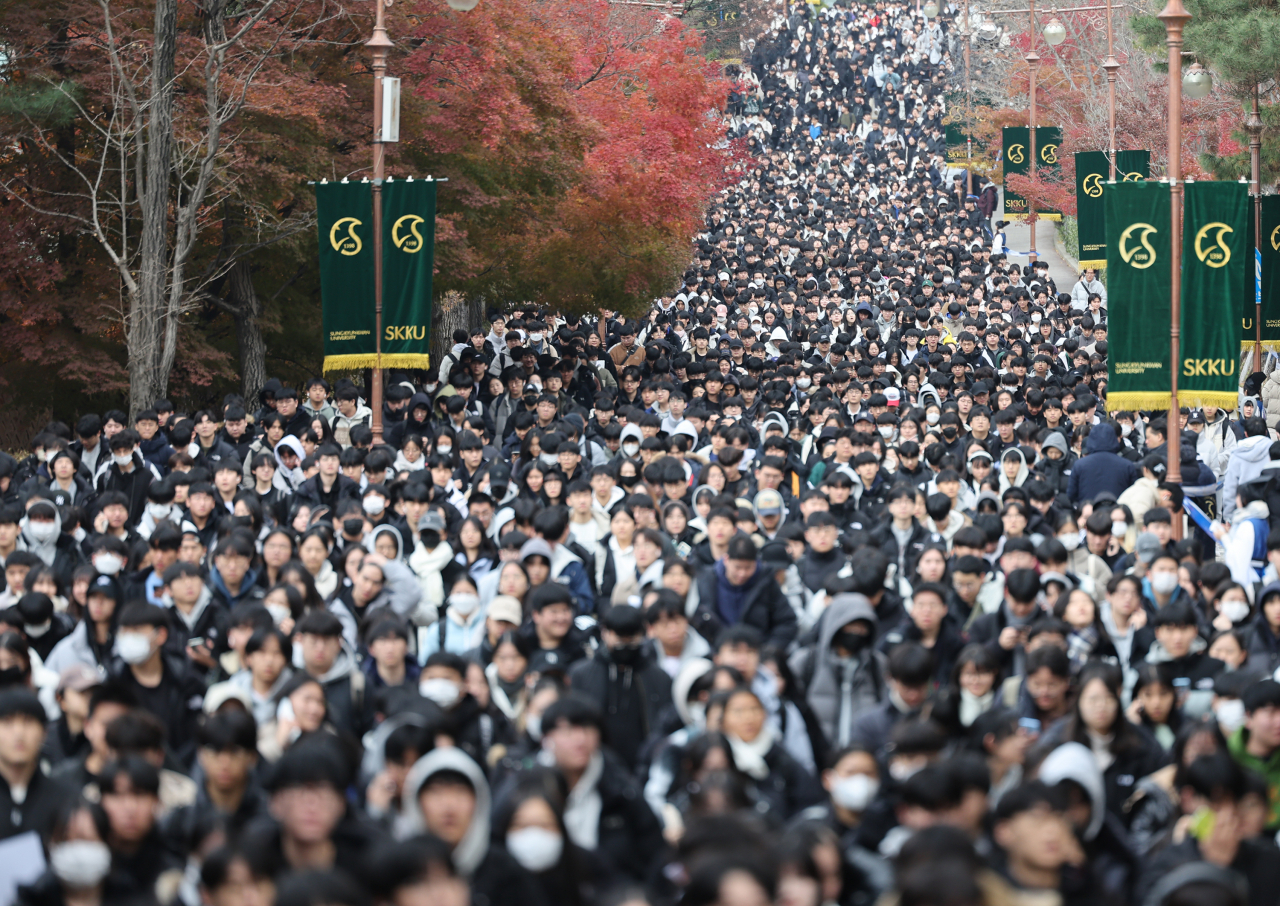 |
High school seniors walk out of Sungkyunkwan University in Jongno-gu, central Seoul, after taking essay tests for admission to the university in 2024, Sunday. The university accepts good essay writers as long as they meet its minimum required Suneung scores. (Yonhap) |
Half a million took the Suneung, South Korea’s national college entrance exam, on Thursday, as this year’s test saw the scrapping of the so-called highly difficult “killer questions” for the first time.
All eyes are on whether the new test format will reduce reliance on private education, as a slew of test takers assessed this year’s Suneung to be more difficult, despite the absence of such questions.
In the run up to the test, many examinees expected the difficulty level of this year’s exam to be more manageable following the Education Ministry’s announcement in June that it would ax questions that demanded knowledge beyond materials taught in school.
But this year’s exam saw around five “tricky” questions in each section that used information taught in public schools but were judged to be as grueling as the killer questions of previous years, according to test takers and experts.
A survey conducted on 2,764 students by EBS showed on Friday that some 85.9 percent of test takers found the overall exam to be onerous.
Some 64.5 percent of respondents found the Korean Language section “extremely difficult,” while the other 23.2 percent found it “moderately hard.” Some 38.2 percent of examinees reported that they found the English section to be “very difficult,” and 32.1 percent of the survey participants found the mathematics section to be “extremely demanding.”
Critics expressed concerns that students will still resort to private education institutions to learn how to solve complex questions that require a high understanding of information taught in public school classrooms.
Lim Seong-ho, the head of Jongno Academy, one of the nation’s leading private education companies, observed that students will likely continue to attend “hagwon,” or cram schools, to acquire the skills needed for solving questions that, while now grounded in school materials, have grown increasingly complex
“Students, for example, must solve each math problem within two to three minutes, but instructors (at private institutions) believe that it’s impossible to do so,” he said.
Choi Soo-il, the head of the Center for Innovation in Mathematics Education at No Worry Education, further highlighted that the test questions extend beyond the content covered in the high school curriculum. This, in turn, compels students to turn to private academies for guidance in adapting to the evolving nature of the questions, given that the Suneung plays a pivotal role in determining educational attainment.
The government announced earlier in June that the Suneung would only cover materials taught in class from this year onward to alleviate students’ stress and parents’ excessive spending on private education, sending signals that it has started on education sector reform.
The committee for this year’s Suneung said during a briefing on Thursday that the questions only included educational material covered in the public school curriculum, adding that those who have prepared and studied well for the exam would be able to get high marks.
The committee also explained that this year’s test has an appropriate level of difficulty to determine students’ ability and knowledge and to distinguish high achieving students.
In addition, the committee said it had tried to avoid using passages requiring a high level of knowledge or questions with too many variables that test-takers have to spend too much time to solve.
Some 50 percent of this year’s test questions came from EBS lectures -- a state-run public broadcaster specializing in education, which offers online courses.
Meanwhile, Koreans spent a record high of 26 trillion won ($20.05 billion) on private education in 2022, with spending on English lessons accounting for the highest proportion, according to data released in March by Statistics Korea and the Education Ministry.







![[Weekender] Korea's traditional sauce culture gains global recognition](http://res.heraldm.com/phpwas/restmb_idxmake.php?idx=644&simg=/content/image/2024/11/21/20241121050153_0.jpg)